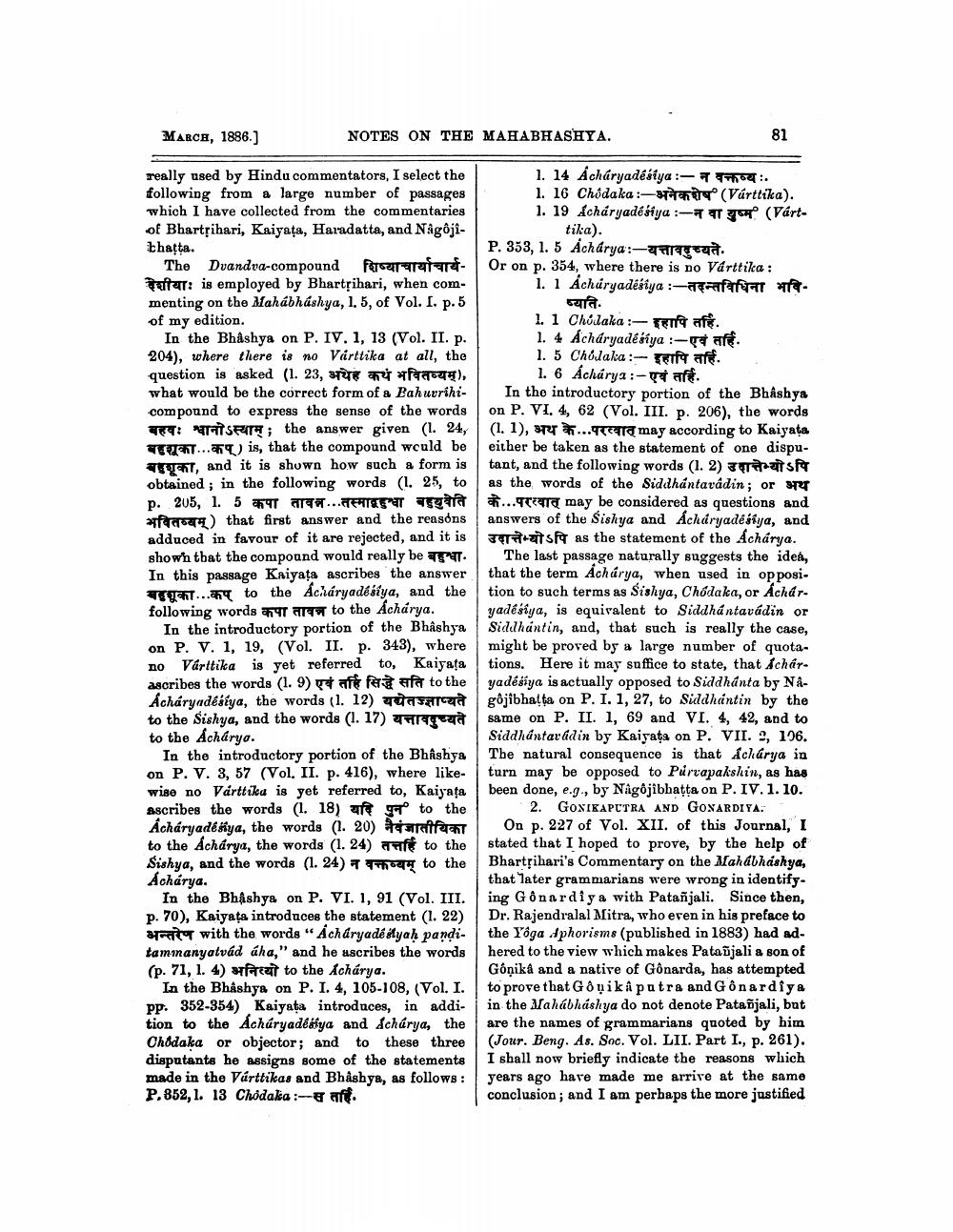________________
MARCH, 1886.)
NOTES ON THE MAHABHASHYA.
81
really used by Hindu commentators, I select the
1. 14 Acharyadésiya :-
:. following from a large number of passages
1. 16 Chšdaka :-
(Várttika). which I have collected from the commentaries
1. 19 Acharyadésiya :- CH (Vártof Bhartrihari, Kaiyata, Haradatta, and Någôji
tika). thatta.
P. 353, 1. 5 Acharya:- ya. The Duandva-compound farruar Or on p. 354, where there is no Varttika: Tatar: is employed by Bhartřihari, when com
1. 1 Achúryadésiya :- affa fermenting on the Mahábháshya, 1.5, of Vol. I. p.5
. of my edition.
1. 1 Chúlaka :- rig af. In the Bhashya on P. IV. 1, 13 (Vol. II. p. 1. 4 Acháryadésiya :- afe. 204), where there is no Virttika at all, the
1. 5 Chodaka:- Tifa af. question is asked (1. 23, STUTE fauty),
1. 6 Achárya :- afd. what would be the correct form of a Bahuvrihi- In the introductory portion of the Bhashya compound to express the sense of the words on P. VI. 4, 62 (Vol. III. p. 206), the words
T: TATT SRITE; the answer given (1. 24, (1.1), sper ...Tatra may according to Kaiyata TERIT... ) is, that the compound would be either be taken as the statement of one dispu
er, and it is shown how such a form is tant, and the following words (1.2) Teras obtained in the following words (1. 25, to as the words of the Siddhantavadin; or 97 p. 205, 1.5 T Ta... HTETT yarat के...परत्वात् may be considered as questions and
f ) that first answer and the reasons answers of the Sishya and Acharyadesiya, and adduced in favour of it are rejected, and it is | उदात्तेभ्योऽपि as the statement of the Acharya. shown that the compound would really be . The last passage naturally suggests the idea, In this passage Kaiyața ascribes the answer that the term Achárya, when used in opposiT h ...cy to the Acharyadésiya, and the tion to such terms as Sishya, Chodaka, or Achár. following words ay ar to the Acharya. yadésiya, is equivalent to Siddhá ntavádin or
In the introductory portion of the Bhâshya Siddhantin, and, that such is really the case, on P. V. 1, 19, (Vol. II. p. 343), where might be proved by a large number of quotano Varttika is yet referred to, Kaiyata tions. Here it may suffice to state, that Ichár. ascribes the words (1.9) #af& f afar to the yadésiya is actually opposed to Siddhanta by NAAcharyadésiya, the words (1. 12) vastaa gôjibhatta on P. I. 1, 27, to Siddhantin by the to the Sishya, and the words (1. 17)
T
a same on P. II. 1, 69 and VI. 4, 42, and to to the Acharya.
Siddhantav hdin by Kaiyata on P. VII. ?, 196. In the introductory portion of the Bhashya The natural consequence is that Acharya in on P. V. 3, 57 (Vol. II. p. 416), where like- turn may be opposed to Purtapakshin, as has wise no Varttika is yet referred to, Kaiyata been done, e.g., by Nagôjibhatta on P. IV.1.10. ascribes the words (1. 18) af go to the
2. GOXIKAPUTRA AND GOXARDIYA:Acharyadé fiya, the words (1. 20) # hT On p. 227 of Vol. XII. of this Journal, I to the Acharya, the words (1. 24) Taf to the stated that I hoped to prove, by the help of Sishya, and the words (1. 24) T ou to the Bhartrihari's Commentary on the Mahabhashya, Acharya.
that later grammarians were wrong in identify. In the Bhashya on P. VI. 1, 91 (Vol. III. ing Gônardiya with Patañjali. Since then, p. 70), Kaiyata introduces the statement (1. 22) Dr. Rajendralal Mitra, who eren in his preface to
Tort with the words "Acharyadé dyah pandi- the Yoga dphorisms (published in 1883) had adtammanyatvád áha," and he ascribes the words hered to the view which makes Patañjali a son of (p. 71, 1. 4) free to the Achárya.
Góņika and a native of Gônarda, has attempted In the Bhâshya on P. I. 4, 105-108, (Vol. I. to prove that GoŅiká patra and Gônardiya pp. 352-354) Kaiyata introduces, in addi- in the Mahabhashya do not denote Patañjali, but tion to the Acháryadésiya and Achárya, the are the names of grammarians quoted by him Chodaka or objector; and to these three (Jour. Beng. As. Soc. Vol. LII. Part I., p. 261). disputants he assigns some of the statements I shall now briefly indicate the reasons which made in the Várttikas and Bhashya, as follows: years ago have made me arrive at the same P.852, 1. 13 Chodaka :-- af.
conclusion; and I am perbaps the more justified




